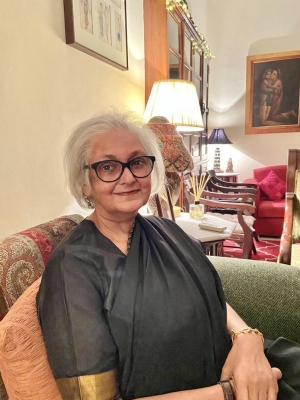
By Sukant Deepak
New Delhi- She was 28 when her first book “Paro: Dreams of Passion” hit the stands. Decades and 20 books since, author Namita Gokhale, who won the Sahitya Akademi Prize for “Things to Leave Behind,†considers all these years to be times of extreme productivity and times of silence, of fallow.
She thinks it’s important to hibernate, to recover imagination and creativity, to rethink.
The prestigious award, she said, left her overwhelmed. “This award has been given to some of the biggest names in Indian literature. Also, this is an Indian award in which every Indian language is represented. When English is honored as an Indian language, it feels good.
In these times of information overload and self-promotion, she says an award like this gives a certain “cachetâ€.
“And what’s wrong if it highlights certain books?” Sahitya Akademi is always cautious, no wonder the award is considered so prestigious. I know so many major authors who have received the award decades after starting to write. Look at me, I can’t get any grayer, she told IANS.
She adds: “Each of these books has been in its own way a journey, a quest, a search for answers. I have worked on novels, short stories, a play, oral histories and I have written for young adults in “The Puffin Mahabharata” and “Lost in Time: Ghatotkacha and the Game of Illusions”. There have been four anthologies, two of which were co-edited with Malashri Lal. Maybe it’s time to rest and listen to the wind whisper for a while.
Speaking about her latest book, “The Blind Matriarchâ€, which she started writing when the Covid pandemic began, and the enigmatic character of “Matangi Maâ€, the author recalls: “The character came to me like an emanation or a visiting muse. I just had to close my eyes and watch her story unfold in front of me. The novel was written in real time, so the events of those strange days would be reflected in the story I was telling. I would send four or five chapters to my editor Manasi Subramaniam, and she would send me her answers.
At a time when literature in Indian languages ​​is widely translated and wins prestigious awards, Gokhale believes that the contemporary literary scene is both rooted and cosmopolitan.
“Although I write in English, I have always been deeply influenced by writing in Hindi and other Indian languages. The concept of “several languages, one literature” is very close to me. Some of my novels, such as “Shakuntala: The Play Of Memory” have been translated into Hindi by “Shakuntala: Smriti Jaal” and “Raag Pahadi” which is the Hindi rendering of “Things to Leave Behind”, and they read even more naturally in the language which is their natural context. I am delighted with the flowering of literary translations, both in English and in other Indian languages, which we are seeing right now. “
The Jaipur Literature Festival (JLF), which she founded, will this time have a hybrid model. She says it would be unfair to impose the old understanding of “reality” on new and emerging interpretations of juxtaposed realities.
“I love the exhilarating sense of community that is so much a part of JLF. The hybrid model allows a wide reach and a great accessibility and it evolves every day… It is a platform that I respect and that I appreciate â€, declares the co-director of the festival.
Noting that Teamwork Arts is closely monitoring and enforcing al Covid precautions when planning the hybrid festival, Gokhale said: “It is a gigantic organizational and logistical task, even in the best of circumstances. The challenges of the present moment demand the necessary prudence and great foresight. All protocols will be scrupulously followed.
While several Western countries ensured that funds did not dry up for artists during the peak of the pandemic, which was not the case in India, the author says: “Many organizations and individuals in India have also done an outstanding job. They are doing all they can, together and individually. Unfortunately, this sector is not a priority for government or business.
Praising the many festivals across India with their different themes and audiences, she believes they do a brilliant job of promoting books and bringing readers and writers together.
“Many other festivals, large and small, including some with which I am associated, contribute enormously to nourishing and supporting creative spaces. We’re all in the same boat, â€she says.
She also hopes to write short stories in 2022.
“I have taken notes for two books that I will start working on in February. No new novels for a while, however, â€she concludes. (IANS)

